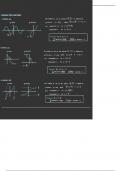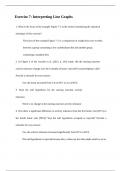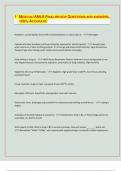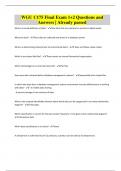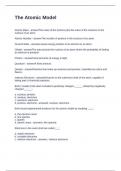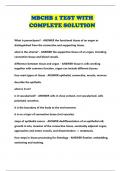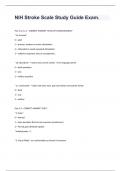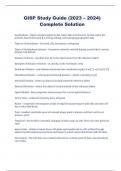INVERSE TRIG FUNCTIONS
1 .
Inverse sin The inverse of sin on interval
-
I' is defined as
sinc arcsin arcsince
siny where -- y -* 3 + -x
y y
=
y
= =
=
, ,
X -
Note : arcsin(since) =x for xE /-Yi ? ]
↑ sinCarcsinc) =
x for [-1 ; 1]
Jos
↳ -
-
↑ 2
-
1) ⑧
( -
1i -
2) Theorem :
for x5 (-1 : 1)
· Carcsine) =
-x ) ! -
x
=
arcsinc + C
2 . Inverse cos
y
=
COS y
=
arCOSS The inverse of cos on the interval [0 ; ] is defined as
( 1 ; 4) 3
0-y-M
Tr
-
x
arccos where +1-x-1
y x
cosy
=
=
⑳ ,
- ⑧
(π ; -
1)
Y ↑/
z
-
Note :
arccos(oss)
cos(arcoss) =
=
x
x for
for
x =
E [-1
[0 ; ]
: 1]
(i
Theorem :
for x((-1 : 1)
· Carcoss) =
-x ) -
x
=
arcoss +
C
3 . Inverse tan
y =ARS y
=
arctans The inverse of tan on the interval (*) is defined as
IY *
I
3
I
-
E R
"
X
M arctanse where
-
y= , =
tany
2
- -
Note
:
arctan(tance) =x for E - :* ]
-
-
- tanCarctans) =
x for E R
2
1 2
- M
2
I Theorem :
for x R
Carctance) =
, x2 / c i
=
arctan +
C
,HXPRBOLIC FUNCTIONS
I
sinn= e- COSECRIC =
sinn
I
e -
COSC
sech-Con
e
+
=
2
RIC es -x Core in
tannic=sns=
-
x
ex
sinn
-
+
e
sinhe
y y 20shx y tanns
=
=
=
f I
-
X X
... ↳ >I
-
!. is -
!
-
- -
I
↳
Hyperbolic derivatives /S integrals)
Hyperbolic function function :
identities :
X
d
sinh(x y) sinks coshy costs sinh(2x) sinho= cost o
+
= ·
+
sinhy . =
2 sinks cost a just +
(
cosh(ccty) = coste ·
coshy + sinks .
Sinky cosh-sint" = 1 a cost = sinc
cosh(2x) =
cost +
sinh =
1 + z sink's I-tank : sech a tann= seck
COMPLEX NUMBERS
--a +
bi where a ,
b t R :
Re( -) =
a 3 (m(-) =
b
Addition :
(a +
bi) +
( +
di) =
(a +
c) +
i(b +
d)
Subtraction
:
(a +
bi) -
(c +
di) =
(a -
c) +
i(b -
d)
Multiplication (a bi)( di) (ac bd) i(bc ad)
:
=
+ + + +
-
=(a+
bilk- bd) i
di) =(ac ad)
a
+ -
Division :
where c=0 d = O
We define the compless bi bi
conjugate of number Di If then-E R
=
a -= -
any as
-
-= a + - =
+
a -
.
,
, Geometric representation of compless numbers :
Im
X
Re(-) By (m) -)
iy determined by ordered (C
y) where
:
-= x an pair x
+ = =
,
,
·
Re
it i le me
relationship
...
x
-
=
-
rcOSO
rcoso
between
+
3
irsing
y
= using
=
-=xc+yi3
r(cos6+isinG)
the
length angle' representation is
Standard form of - : - = x +
yi where x =
ReC -1 3y = 1mC-) with cartesian coordinates (sc , y)
,
.
Polar form of --=r(cosotising) where roso
=
Re(-)3 usino =
1mC-) with polar coordinates Cr ol ,
,
1-1
Modulus x
yi x yz
=
:
r
+
of - = + =
- -
=
Argument of - :
arg)-)= arctan ? =
& + 2nk
,
KE .
If Re(-) Co
,
add subtract i to from a The Principle argument of -
is the
unique argument Arg(-) =
8
,
where 0 =(-4in) .
Note :
for two complex numbers -=r(cosx+ isinx) 3 w =
s(cos +
isin) ,
we have that
-w
=
rs(cos(x +
3) +
isin(x +
B)) 3 w =
(cos(a -
B) +
isin(a-5)) .
Sub-note for any -
,
wD ,
-W = -
-w > i =
i
arg)-w)
=
args -) +
arg(w) S arg(n) =
a w!
I heorem De Moirre's formula ne complex r(cosO isino) ,
:
for any ↳ number -= +
,
·
(r(coso+isina))" =
r(cos(no) + isin(nal)
cor) .
-=-1 arg(-r) =
narg(-)
Theorem
:
for a
positive integer n b a non-zero complex number -
let o be an
argument of -
Then all the nith roots of -
are
given by the formula :
isn( ** )
*
-(cos(0 )
+
n
for 90 n-13
·
K =
+
1 2
=
-
, , . . .,
1 .
Inverse sin The inverse of sin on interval
-
I' is defined as
sinc arcsin arcsince
siny where -- y -* 3 + -x
y y
=
y
= =
=
, ,
X -
Note : arcsin(since) =x for xE /-Yi ? ]
↑ sinCarcsinc) =
x for [-1 ; 1]
Jos
↳ -
-
↑ 2
-
1) ⑧
( -
1i -
2) Theorem :
for x5 (-1 : 1)
· Carcsine) =
-x ) ! -
x
=
arcsinc + C
2 . Inverse cos
y
=
COS y
=
arCOSS The inverse of cos on the interval [0 ; ] is defined as
( 1 ; 4) 3
0-y-M
Tr
-
x
arccos where +1-x-1
y x
cosy
=
=
⑳ ,
- ⑧
(π ; -
1)
Y ↑/
z
-
Note :
arccos(oss)
cos(arcoss) =
=
x
x for
for
x =
E [-1
[0 ; ]
: 1]
(i
Theorem :
for x((-1 : 1)
· Carcoss) =
-x ) -
x
=
arcoss +
C
3 . Inverse tan
y =ARS y
=
arctans The inverse of tan on the interval (*) is defined as
IY *
I
3
I
-
E R
"
X
M arctanse where
-
y= , =
tany
2
- -
Note
:
arctan(tance) =x for E - :* ]
-
-
- tanCarctans) =
x for E R
2
1 2
- M
2
I Theorem :
for x R
Carctance) =
, x2 / c i
=
arctan +
C
,HXPRBOLIC FUNCTIONS
I
sinn= e- COSECRIC =
sinn
I
e -
COSC
sech-Con
e
+
=
2
RIC es -x Core in
tannic=sns=
-
x
ex
sinn
-
+
e
sinhe
y y 20shx y tanns
=
=
=
f I
-
X X
... ↳ >I
-
!. is -
!
-
- -
I
↳
Hyperbolic derivatives /S integrals)
Hyperbolic function function :
identities :
X
d
sinh(x y) sinks coshy costs sinh(2x) sinho= cost o
+
= ·
+
sinhy . =
2 sinks cost a just +
(
cosh(ccty) = coste ·
coshy + sinks .
Sinky cosh-sint" = 1 a cost = sinc
cosh(2x) =
cost +
sinh =
1 + z sink's I-tank : sech a tann= seck
COMPLEX NUMBERS
--a +
bi where a ,
b t R :
Re( -) =
a 3 (m(-) =
b
Addition :
(a +
bi) +
( +
di) =
(a +
c) +
i(b +
d)
Subtraction
:
(a +
bi) -
(c +
di) =
(a -
c) +
i(b -
d)
Multiplication (a bi)( di) (ac bd) i(bc ad)
:
=
+ + + +
-
=(a+
bilk- bd) i
di) =(ac ad)
a
+ -
Division :
where c=0 d = O
We define the compless bi bi
conjugate of number Di If then-E R
=
a -= -
any as
-
-= a + - =
+
a -
.
,
, Geometric representation of compless numbers :
Im
X
Re(-) By (m) -)
iy determined by ordered (C
y) where
:
-= x an pair x
+ = =
,
,
·
Re
it i le me
relationship
...
x
-
=
-
rcOSO
rcoso
between
+
3
irsing
y
= using
=
-=xc+yi3
r(cos6+isinG)
the
length angle' representation is
Standard form of - : - = x +
yi where x =
ReC -1 3y = 1mC-) with cartesian coordinates (sc , y)
,
.
Polar form of --=r(cosotising) where roso
=
Re(-)3 usino =
1mC-) with polar coordinates Cr ol ,
,
1-1
Modulus x
yi x yz
=
:
r
+
of - = + =
- -
=
Argument of - :
arg)-)= arctan ? =
& + 2nk
,
KE .
If Re(-) Co
,
add subtract i to from a The Principle argument of -
is the
unique argument Arg(-) =
8
,
where 0 =(-4in) .
Note :
for two complex numbers -=r(cosx+ isinx) 3 w =
s(cos +
isin) ,
we have that
-w
=
rs(cos(x +
3) +
isin(x +
B)) 3 w =
(cos(a -
B) +
isin(a-5)) .
Sub-note for any -
,
wD ,
-W = -
-w > i =
i
arg)-w)
=
args -) +
arg(w) S arg(n) =
a w!
I heorem De Moirre's formula ne complex r(cosO isino) ,
:
for any ↳ number -= +
,
·
(r(coso+isina))" =
r(cos(no) + isin(nal)
cor) .
-=-1 arg(-r) =
narg(-)
Theorem
:
for a
positive integer n b a non-zero complex number -
let o be an
argument of -
Then all the nith roots of -
are
given by the formula :
isn( ** )
*
-(cos(0 )
+
n
for 90 n-13
·
K =
+
1 2
=
-
, , . . .,

